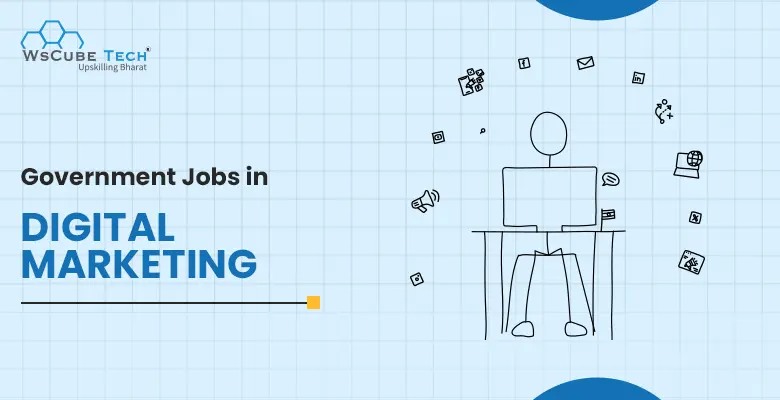Securing a government job in India is a common dream among many, symbolizing job security, prestige, and a steady pathway to a stable future. With millions of aspirants each year dedicating countless hours to preparing for a variety of competitive exams, the desire to join the public sector is more than just a career choice; it’s a deeply ingrained ambition.
Amidst traditional government roles, there’s a growing niche that’s gaining prominence: digital marketing jobs in government or public sector. As the government increasingly embraces digital platforms to communicate, engage with citizens, and promote initiatives, the demand for skilled digital marketers is on the rise.
If you aspire to pursue career in digital marketing in government sector, the first thing to do is to upskill yourself. Because these kinds of jobs are more about skills and practicality, rather than theoretical things like reading books or practicing mock tests. You can upskill with the live online digital marketing course by WsCube Tech.
Here, we’ll guide you through the landscape of government jobs in digital marketing in India, offering insights into how you can secure a position that combines the prestige of public service with the dynamic, fast-paced world of digital marketing.

What is Digital Marketing?
Digital marketing includes a wide range of marketing activities carried out through digital channels to promote products, services, or brands to a target audience.
Unlike traditional marketing, which relies on print, television, and radio, digital marketing uses the internet and digital devices, enabling marketers to reach and engage with their audience in real-time and across multiple platforms.
At its core, digital marketing includes the strategic use of online platforms such as social media, websites, email, search engines like Google, mobile apps, and other digital mediums to connect with current and potential customers.
Digital marketing strategies aim to achieve various objectives, including building brand awareness, generating leads, increasing sales, and fostering customer loyalty. To do this effectively, digital marketers employ a mix of tactics such as:
- search engine optimization (SEO) to improve online visibility
- content marketing to provide valuable and relevant content
- social media marketing to engage with users on popular platforms
- email marketing to reach customers directly in their inboxes
- pay-per-click (PPC) advertising and affiliate marketing to drive traffic and sales
- digital analytics tools to measure the success of these efforts.
Upskill Yourself With Live Training (Book Free Class)
Importance of Digital Marketing Jobs in Government Sector

Digital marketing in the government or public sector has become increasingly important for several reasons, reflecting a shift towards more modern, efficient, and effective means of communication and engagement:
1. Enhanced Public Engagement
Digital marketing allows government agencies to directly engage with the public in real-time, fostering a two-way communication channel. Through social media, blogs, and forums, governments can receive immediate feedback, address concerns, and gauge public sentiment on various issues.
2. Improved Service Delivery
Digital platforms enable the government to share information quickly and efficiently, improving the delivery of public services. Websites, mobile apps, and online portals make it easier for citizens to access services, submit applications, and find important information without physical barriers.
Also Read: What is Search Engine Marketing ? SEM in Digital Marketing
3. Increased Transparency and Accountability
By using digital marketing tools, governments can share information openly, promoting transparency. Regular updates on projects, initiatives, and spending through digital channels help in building trust and accountability in public administration.
4. Cost-Effectiveness
Compared to traditional marketing and communication methods, digital marketing is more cost-effective, allowing governments to reach a wider audience at a lower cost. This is particularly important in resource-constrained public sector environments.
5. Crisis Communication and Management
Digital marketing plays a crucial role in crisis communication, enabling governments to share urgent public health messages, disaster warnings, and safety information swiftly and broadly across multiple channels.
6. Promoting Public Awareness and Education
Government agencies use digital marketing to educate the public on various issues, including health campaigns, environmental awareness, and public safety measures. This helps in changing behaviors and promoting a more informed citizenry.
7. Enhancing Citizen Participation
Digital platforms facilitate greater citizen participation in governance processes, including public consultations, feedback on policy proposals, and community engagement initiatives. This can lead to more democratic and inclusive decision-making. This plays a crucial role in the rise of government jobs in digital marketing.
8. Global Reach and Diplomacy
Digital marketing extends the reach of government communications globally, enabling the promotion of trade, tourism, and diplomatic messages to an international audience, enhancing a country’s image and influence on the global stage.
9. Personalized Messaging
With the analytics and targeting capabilities of digital marketing, governments can personalize messages to specific segments of the population, ensuring that the content is relevant and resonates with different audiences.
Departments Hiring for Government Jobs in Digital Marketing
Government departments and agencies increasingly recognize the value of digital marketing. As a result, several departments and agencies are commonly known to hire for digital marketing government jobs in India.
1. Ministry of Information and Broadcasting
This department is responsible for the dissemination of information about government policies, programs, and initiatives to the public. Digital marketers here work on social media campaigns, content creation, and managing online public relations.
2. Ministry of Education
This department uses digital marketing to promote educational programs, initiatives, and reforms. This includes creating engaging content for social media, managing educational portals, and running online campaigns to increase awareness about educational opportunities and resources.
3. Ministry of Health and Family Welfare
Digital marketers play a crucial role in public health campaigns, including awareness about diseases, vaccination drives, and healthy living practices. They use various digital platforms to disseminate vital health information to the public.
4. Ministry of Tourism
At both the national and local levels, tourism departments hire digital marketers in government sector to promote tourist destinations, cultural heritage sites, and events. This involves creating engaging content, managing social media channels, and running ad campaigns aimed at attracting domestic and international tourists.
Also Read: 10 Digital Marketing Tips and Tricks for Beginners (2024)
5. Municipal Corporations and Local Government Bodies
Local government entities employ digital marketers to communicate with residents about local services, initiatives, and events. This includes managing websites and social media platforms, digital newsletters, and online community engagement.
6. Public Sector Undertakings (PSUs)
Many PSUs in sectors like banking, energy, and transportation hire digital marketing professionals to manage their online presence, customer engagement, and digital campaigns promoting their services and initiatives.
7. Ministry of Commerce and Industry
Involved in promoting trade, investments, and industrial policies, this ministry uses digital marketing to reach businesses, investors, and the general public with relevant information and initiatives.
8. Department of Science and Technology
Digital marketers in this department work on promoting scientific research, technological innovations, and STEM (Science, Technology, Engineering, and Mathematics) education among the public and specific interest groups.
9. Environmental Agencies
Focused on raising awareness about environmental issues, conservation efforts, and sustainability initiatives. Digital marketing strategies include social media campaigns, informational websites, and interactive online events.
10. Defense and Military Departments
While not traditionally associated with digital marketing, these departments increasingly use digital channels for recruitment campaigns, public relations, and showcasing military achievements and events.
Interview Questions for You to Prepare for Jobs
| Digital Marketing Interview Questions | SEO Interview Questions |
| Email Marketing Interview Questions | Content Writing Interview Questions |
Skills and Qualifications for Government Digital Marketing Jobs
Getting the digital marketing jobs in government sector requires a blend of formal education, specific skill sets, and sometimes, relevant certifications. Given the diverse nature of digital marketing roles and the unique requirements of the public sector, candidates should aim to build a comprehensive profile that shows both their technical competencies and their understanding of public sector communication principles.
Educational Qualifications
1. Bachelor’s Degree
A bachelor’s degree in marketing, communications, public relations, business administration, or a related field is often a fundamental requirement. Some positions might also value degrees in public administration or political science, especially if they align closely with the department’s focus.
2. Specialized Degrees or Courses
Degree or course in digital marketing, media studies, or information technology can provide a competitive edge, offering specialized knowledge in digital content creation, social media strategy, SEO, and analytics.
3. Master’s Degree (Optional)
While not always required, a master’s degree in digital marketing, business administration (MBA) with a marketing concentration, or a related field can enhance prospects for higher-level positions. This is particularly relevant for roles that demand strategic planning and leadership.
Also Read: How to Learn Digital Marketing? 2024 Guide
Digital Marketing Skills
1. Content Creation and Management
Ability to develop engaging and relevant content tailored to different digital platforms (websites, social media, blogs) and understand content management systems (CMS).
2. Social Media Management
Proficiency in managing social media platforms, crafting strategies to engage diverse audiences, and using tools for scheduling, monitoring, and analyzing social media activity. One can learn it with an online social media marketing course.
3. SEO and SEM
Understanding of search engine optimization (SEO) and search engine marketing (SEM) practices to enhance website visibility and traffic. You can learn it with an online SEO course.
4. Email Marketing
Skills in designing and implementing email marketing campaigns, understanding best practices for email content, and analyzing performance metrics to improve engagement. Learn the core concepts with the free email marketing course.
5. Data Analytics
Competency in using analytics tools (e.g., Google Analytics) to track and interpret user behavior, campaign performance, and website traffic to inform decision-making.
6. Graphic Design and Multimedia
Basic to intermediate skills in graphic design and multimedia creation for developing visual content for digital campaigns, using software like Adobe Creative Suite.
7. Project Management
Ability to plan, execute, and manage digital marketing projects within budget and timeline constraints, often coordinating with multiple stakeholders.
8. Communication and Writing Skills
Strong written and verbal communication skills are crucial for crafting clear, persuasive, and audience-appropriate content, as well as for effective team collaboration.
Career Opportunities in Digital Marketing Government Jobs in India

Government jobs in digital marketing offer an exciting and stable career path in a continuously evolving sector. As government agencies increasingly rely on digital marketing to communicate with citizens and deliver services, the demand for experts in this field will only grow.
Government digital marketing jobs encompass a wide range of roles. These roles include social media managers, content creators, SEO specialists, data analysts, and more. Each role is crucial in creating and implementing effective digital marketing strategies for government agencies. These positions offer professionals the chance to make a meaningful impact on public communication and outreach.
Government digital marketing uses online channels and technology to communicate with and engage citizens, promote government initiatives, and deliver public services. It’s a multifaceted field with diverse roles and responsibilities.
Here are some of the key roles involved in government digital marketing:
1. Digital Marketing Coordinator
A digital marketing coordinator manages the day-to-day tasks of a government agency’s digital marketing strategy. This may include creating and executing email campaigns, managing the agency’s social media accounts, and tracking the success of digital marketing efforts.
2. Digital Content Manager
The digital content manager is responsible for creating, curating, and publishing content for a government agency’s digital channels. This may include writing blog posts, making infographics, and managing the agency’s website.
3. Digital Marketing Analyst
The digital marketing analyst analyses data to understand the performance of a government agency’s digital marketing efforts. This may include analyzing website traffic, social media engagement, and the success of digital advertising campaigns.
4. Social Media Manager
The social media manager manages a government agency’s accounts and develops strategies to increase engagement and reach. This may include creating and scheduling posts, monitoring and responding to comments, and analyzing the success of social media campaigns.
5. Digital Advertising Specialist
The digital advertising specialist is responsible for creating and executing advertising campaigns for a government agency. This may include developing and placing online ads, analyzing the success of advertising efforts, and producing reports to present to stakeholders.
6. SEO Specialist
SEO specialists optimize government websites and content to rank well in search engine results, making information easily accessible to citizens. They identify relevant keywords and phrases to include in digital content and implement on-page and off-page SEO techniques to improve website visibility.
7. Data Analyst
Data Analyst collects and analyzes data from digital marketing campaigns to measure their impact. Create reports and dashboards to present insights and KPIs to government officials and make recommendations based on data to optimize marketing strategies.
Also Read: Difference Between Digital Marketing vs Traditional Marketing: 2024 Comparison
Selection Process for Digital Marketing Government Jobs
The selection process for digital marketing positions in the public sector can be quite distinct from that in the private sector, primarily due to the emphasis on transparency, fairness, and adherence to regulatory and policy guidelines.
While specific processes can vary by region and level of government, here is a general overview of the stages involved in selecting candidates for digital marketing roles within the public sector:
1. Job Announcement and Application Submission
- Initial Announcement: Government agencies announce job openings on their official websites, job portals dedicated to government employment, and sometimes in print media. These announcements detail the job description, qualifications required, application deadline, and how to apply.
- Application Submission: Candidates must submit their applications through the specified channels, which could include online application portals or direct mail. Applications usually require a resume, cover letter, and sometimes, a portfolio of work or case studies relevant to digital marketing.
2. Screening and Shortlisting
- Initial Screening: Applications are screened to ensure they meet the minimum educational qualifications and experience requirements. This stage might involve automated systems to filter applications based on specific criteria.
- Shortlisting: Shortlisted candidates are those whose qualifications, experience, and skills closely match the job requirements. They are notified via email or phone and invited to participate in the next stage of the selection process.
3. Written Test (If Applicable)
Some government agencies may require candidates to take a written test designed to assess their knowledge of digital marketing principles, strategies, tools, and practices. The test might also include sections on general aptitude, reasoning, and language skills.
4. Interviews
- Preliminary Interviews: The first round of interviews may be conducted to assess the candidates’ communication skills, understand their experience, and gauge their suitability for the role. This could be in-person, via video conference, or even a telephone interview.
- Panel Interviews: Shortlisted candidates may then face a panel interview involving multiple interviewers, including digital marketing experts, HR personnel, and department heads. This stage assesses the candidates’ technical skills, problem-solving abilities, and cultural fit within the public sector environment.
5. Practical Assessment
For certain positions, candidates might be asked to complete a practical task, such as creating a digital marketing campaign proposal, performing a website audit, or developing a content strategy. This helps evaluate their practical skills and ability to apply digital marketing knowledge in real-world scenarios.
6. Reference Checks and Background Verification
Before finalizing the selection, the agency conducts reference checks and background verification to ensure the candidate’s qualifications, past employment history, and any other relevant details are accurate and meet the integrity standards of public service.
7. Offer of Employment
Successful candidates are extended a formal job offer, detailing the position, salary, benefits, and other terms of employment. Acceptance of the offer typically initiates the onboarding process.
8. Onboarding and Probation
New hires usually undergo an onboarding process, which might include training specific to public sector policies, digital marketing tools and platforms used by the agency, and any regulatory compliance requirements. There may also be a probationary period during which the employee’s performance is closely monitored.
Also Read: Digital Marketing Salary in India: 2024 Income & Earnings
Benefits of Govt Jobs in Digital Marketing

Pursuing a career in digital marketing within the government sector of India offers a unique set of benefits:
1. Job Stability and Security
Government jobs are renowned for their stability and security. Unlike the private sector, where economic downturns can lead to layoffs, government positions are generally more secure, offering long-term employment prospects.
2. Public Service and Impact
Working in digital marketing within the government allows individuals to contribute directly to meaningful public service initiatives. Whether it’s promoting public health campaigns, educational programs, or environmental awareness, your work can have a significant positive impact on society.
3. Work-Life Balance
Government jobs often provide a more balanced approach to work and personal life. Regular working hours, predictable schedules, and generous leave policies help employees maintain a healthy balance between their professional and personal lives.
4. Benefits and Pensions
Government positions typically come with comprehensive benefits, including health insurance, retirement plans, and pensions that are often more favorable than those offered in the private sector. These benefits contribute to financial security and peace of mind.

5. Professional Development
Governments are increasingly investing in digital infrastructure and capabilities, offering digital marketing professionals opportunities for continuous learning and advancement in emerging technologies and strategies. Professional development programs, training workshops, and conferences are often available to government employees.
6. Diverse Work Environment
Working in the public sector exposes you to a wide range of projects, campaigns, and initiatives. This diversity can enhance your skills and experiences, making your job more interesting and challenging.
7. Networking Opportunities
Government digital marketers often collaborate with various departments, agencies, and external partners, providing vast networking opportunities. These connections can be valuable for career growth and professional development.
8. Ethical and Transparent Working Conditions
The public sector operates under strict ethical and transparency standards, creating a work environment that values integrity, accountability, and public trust. For many, working in such an environment is both rewarding and fulfilling.
9. Opportunities for Innovation
Despite perceptions of government being slow to adopt new technologies, there’s a growing emphasis on innovation to improve public services and engagement. Digital marketers have the chance to lead and implement innovative digital strategies that can transform public communication and services.
Free Courses for You
| Course Name | Course Name |
| Google Tag Manager Course | Affiliate Marketing Course |
| Semrush Course | Video Editing Course |
| Blogging Course | Email Marketing Course |
| Shopify Course | Photoshop Course |
Conclusion
Digital marketing is indispensable in the government sector, creating various job opportunities for those interested in this field. From digital marketing coordinators to web designers and developers, many different roles within the government sector offer a rewarding career in digital marketing.
Whether you are just starting or looking to make a career change, consider exploring the opportunities available in government digital marketing. If you have a passion for marketing and a desire to impact society positively, a government digital marketing career might be the perfect fit for you.
Read more blogs:



